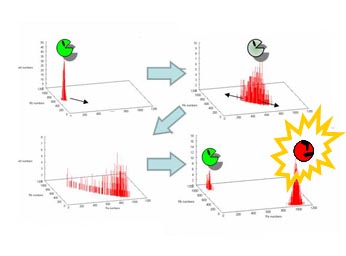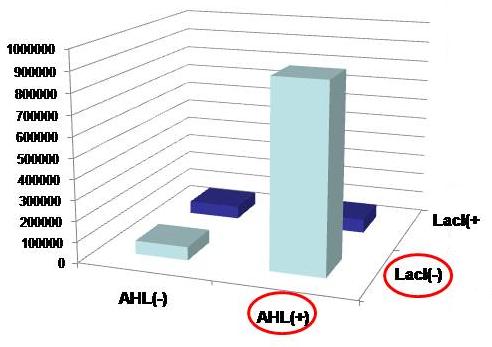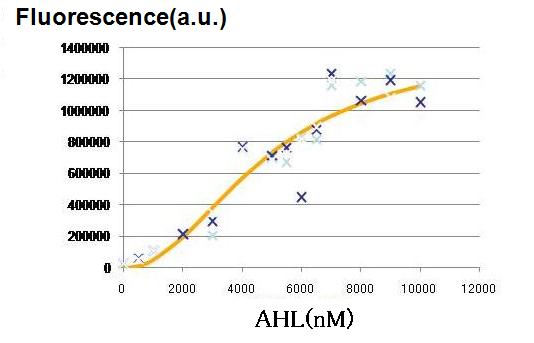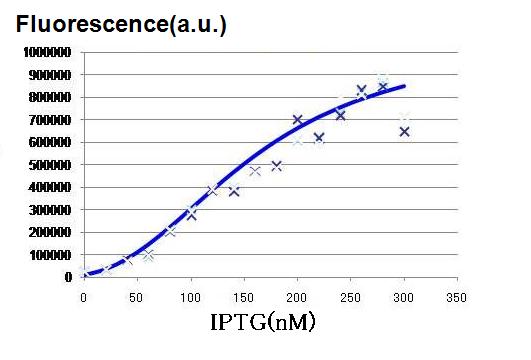Tokyo/Works
From 2007.igem.org
(→0.<span style="color:#ff33cc;">Wet </span>: Hybrid promoter) |
|||
| Line 2: | Line 2: | ||
==[[Tokyo_Tech|Abstruct]] [[Tokyo/Model|Concept & Model]] [[Tokyo/Requirements |Requirements]] [[Tokyo/Genetic circuit|Genetic_circuit]] [[Tokyo/Works|Works]] [[Tokyo/about our team|About_our_team]]== | ==[[Tokyo_Tech|Abstruct]] [[Tokyo/Model|Concept & Model]] [[Tokyo/Requirements |Requirements]] [[Tokyo/Genetic circuit|Genetic_circuit]] [[Tokyo/Works|Works]] [[Tokyo/about our team|About_our_team]]== | ||
| - | <br>[[Tokyo/Works|Works top]] 0.[[Tokyo/Hybrid promoter|Hybrid promoter]] 1.[[Tokyo/Formulation |Formulation]] 2.[[Tokyo/Assay |Assay1]] 3.[[Tokyo/Simulation |Simulation]] 4.[[Tokyo/Assay2 |Assay2]] 5.[[Tokyo/Future works |Future works]] | + | |
| + | <br>[[Tokyo/Works|Works top]] 0.[[Tokyo/Works/Hybrid promoter|Hybrid promoter]] 1.[[Tokyo/Works/Formulation |Formulation]] 2.[[Tokyo/Works/Assay |Assay1]] 3.[[Tokyo/Works/Simulation |Simulation]] 4.[[Tokyo/Works/Assay2 |Assay2]] 5.[[Tokyo/Works/Future works |Future works]] | ||
<h1>'''Works'''</h1> | <h1>'''Works'''</h1> | ||
| - | + | ||
| - | + | ||
====Approach==== | ====Approach==== | ||
We have alternated/combined <span style="color:#ff33cc;">Wet </span> and <span style="color:#0066ff;">Dry </span> experiments to achieve our goal | We have alternated/combined <span style="color:#ff33cc;">Wet </span> and <span style="color:#0066ff;">Dry </span> experiments to achieve our goal | ||
| - | ==0.<span style="color:#ff33cc;">Wet </span>: [[Tokyo/Hybrid promoter|Hybrid promoter]]== | + | ==0.<span style="color:#ff33cc;">Wet </span>: [[Tokyo/Works/Hybrid promoter|Hybrid promoter]]== |
{| cellspacing="5" | {| cellspacing="5" | ||
|width="350px" valign="top" | | |width="350px" valign="top" | | ||
| Line 23: | Line 23: | ||
|} | |} | ||
| - | ==1.<span style="color:#0066ff;">Dry </span>: [[Tokyo/Formulation |Formulation]]== | + | ==1.<span style="color:#0066ff;">Dry </span>: [[Tokyo/Works/Formulation |Formulation]]== |
We wrote the Formulation | We wrote the Formulation | ||
<!--リプレッサーA,B,シグナル分子Sの時間変化を式として表し、安定性解析を行った結果、Hill係数が大切であることがわかった | <!--リプレッサーA,B,シグナル分子Sの時間変化を式として表し、安定性解析を行った結果、Hill係数が大切であることがわかった | ||
| Line 29: | Line 29: | ||
--> | --> | ||
| - | ==2.<span style="color:#ff33cc;">Wet </span>: [[Tokyo/ | + | ==2.<span style="color:#ff33cc;">Wet </span>: [[Tokyo/Works/Assay1 |Assay1 using "Externally added" materials]]== |
====We decided the parameter of hill coefficients by the assay of AHL & IPTG==== | ====We decided the parameter of hill coefficients by the assay of AHL & IPTG==== | ||
| Line 37: | Line 37: | ||
[[Image:hill AHL.JPG|190px]]|[[Image:hill IPTG.JPG|190px]] | [[Image:hill AHL.JPG|190px]]|[[Image:hill IPTG.JPG|190px]] | ||
| - | ==3.<span style="color:#0066ff;">Dry </span>: [[Tokyo/Simulation |Simulation]]== | + | ==3.<span style="color:#0066ff;">Dry </span>: [[Tokyo/Works/Simulation |Simulation]]== |
<!--wet実験で求められたパラメータを用いて、集団が怠け者の細胞のみとなった場合に、一度不安定化して、続いて働き者と怠け者になれることをStocastic Simulationで確認した。このシステムの挙動に必要な他のパラメータ範囲が判明した。--> | <!--wet実験で求められたパラメータを用いて、集団が怠け者の細胞のみとなった場合に、一度不安定化して、続いて働き者と怠け者になれることをStocastic Simulationで確認した。このシステムの挙動に必要な他のパラメータ範囲が判明した。--> | ||
| Line 45: | Line 45: | ||
<br>[[Image:Tokyo_simulation_s2.jpg|350px]] | <br>[[Image:Tokyo_simulation_s2.jpg|350px]] | ||
| - | ==4.<span style="color:#ff33cc;">Wet </span>: [[Tokyo/Assay2 |Assay2 using "Cell-produced" AHL]]== | + | ==4.<span style="color:#ff33cc;">Wet </span>: [[Tokyo/Works/Assay2 |Assay2 using "Cell-produced" AHL]]== |
<!--====We determined the feasibility test of this ====--> | <!--====We determined the feasibility test of this ====--> | ||
<!--Simulationを満たすための他のパラメータが現在のプラスミドで可能であるかを、大腸菌を用いた実験で確認した。--> | <!--Simulationを満たすための他のパラメータが現在のプラスミドで可能であるかを、大腸菌を用いた実験で確認した。--> | ||
| Line 51: | Line 51: | ||
<br> | <br> | ||
| - | ==5.[[Tokyo/Future works |Future works]]== | + | ==5.[[Tokyo/Works/Future works |Future works]]== |
Based on the results from the wet experiments in the step 4, the next dry approach - analysis and simulation - should be performed, which will in turn be testified and confirmed by wet experiments. | Based on the results from the wet experiments in the step 4, the next dry approach - analysis and simulation - should be performed, which will in turn be testified and confirmed by wet experiments. | ||
Continueing these processes, if time permits, would further sophisticate our model. | Continueing these processes, if time permits, would further sophisticate our model. | ||
| - | |||
| - | |||
| - | |||
| - | |||
| - | |||
| - | |||
| - | |||
| - | |||
| - | |||
Revision as of 14:20, 23 October 2007
Abstruct Concept & Model Requirements Genetic_circuit Works About_our_team
Works top 0.Hybrid promoter 1.Formulation 2.Assay1 3.Simulation 4.Assay2 5.Future works
Works
Approach
We have alternated/combined Wet and Dry experiments to achieve our goal
0.Wet : Hybrid promoter
We need to develop the promoter that can receive two input, AHL & reperssor. We tried to create and succeeded!! |
1.Dry : Formulation
We wrote the Formulation
2.Wet : Assay1 using "Externally added" materials
We decided the parameter of hill coefficients by the assay of AHL & IPTG
3.Dry : Simulation
Based on stochastic simulation using parameters obtained from our wet experiments, we have confirmed that the whole system becomes unstable when there are only idlers left, and then, they become either of workers and idlers. Also we have determined other parameters necessary for the desired behavior of this system.

4.Wet : Assay2 using "Cell-produced" AHL
By the wet experiments using E. coli, we testified whether our current plasmids could satisfy the other required conditions (for the desired behavior of the system) estimated by the simulation.
5.Future works
Based on the results from the wet experiments in the step 4, the next dry approach - analysis and simulation - should be performed, which will in turn be testified and confirmed by wet experiments. Continueing these processes, if time permits, would further sophisticate our model.


